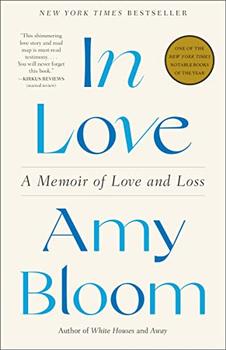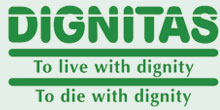Summary | Excerpt | Reviews | Beyond the Book | Read-Alikes | Genres & Themes | Author Bio

A Memoir of Love and Loss
by Amy BloomThis article relates to In Love
 In her book In Love, Amy Bloom's husband, Brian Ameche, decides to end his life prematurely, before his Alzheimer's disease becomes too debilitating.
In her book In Love, Amy Bloom's husband, Brian Ameche, decides to end his life prematurely, before his Alzheimer's disease becomes too debilitating.
Being Americans, they first explored taking advantage of laws in the US allowing physician-assisted suicide, also known as death with dignity. This option first became available in Oregon in 1997, and has since become legal in 10 states and the District of Columbia. A 2018 Gallup poll indicates that 72% of Americans support allowing terminally ill individuals the choice to end their lives painlessly through physician-prescribed lethal medication.
The laws vary a little from state to state, but they generally have the same criteria. A person must be at least 18 years old, capable of making and communicating health care decisions for themselves, and have been diagnosed with a terminal illness that will lead to death within six months. They must also be residents of the state in which they're seeking treatment. If someone meets those benchmarks, they can then request a prescription for a lethal medication from a local physician willing to participate in the process. In the majority of states where it is legal, the person must make two oral requests, 15 days apart, and one written request with two witnesses. A second physician must confirm the person's diagnosis and prognosis, and if there's any concern about their mental state, they may be referred to a mental health professional for evaluation. The primary doctor is further required to inform the individual of other options (pain management, hospice, etc.) before providing the necessary medication.
Needless to say, these steps prevent Alzheimer's sufferers from taking advantage of physician-assisted suicide. By the time most are within six months of death, they're unable to clear the mandated hurdles. Bloom and Ameche were only able to find one organization that might help — a Swiss non-profit called Dignitas.
The organization's official name is "DIGNITAS – To live with dignity – To die with dignity," and it was founded in 1998 by Ludwig Minelli, a Swiss lawyer who specializes in human rights law. Designed to benefit Swiss citizens, it's primarily funded by membership dues — a one-time fee of 200 Swiss Francs plus an annual fee of 80 Swiss Francs (about USD$212 and $87 respectively) — which guarantees that Dignitas will work with family and physicians to ensure a person's advance directive is honored. The funds also go to support the organization's legal efforts to both defend their own actions and to make sure assisted suicide remains an option in Switzerland. Any money left over is donated to suicide prevention causes.
Dignitas also provides "accompanied suicide," which allows an individual to take their own life painlessly, in a peaceful setting. It operates in a sort of gray area with regard to Swiss law, which allows anyone to assist with a suicide provided they're not operating out of selfish motives. Since Switzerland's right-to-die laws don't have a residency requirement and since options are limited or nonexistent elsewhere, many citizens of other countries travel there specifically to take advantage of Dignitas's offering (referred to by some as "suicide tourism").
A person must meet several criteria before Dignitas is willing to "green light" them. They must:
Those seeking this type of assistance must still undergo an arduous process that involves a lot of paperwork, the submission of medical records, and several interviews with Dignitas physicians, among other things. Most often it's the "be of sound mind" clause that presents roadblocks; assisted suicide for those diagnosed with a mental illness is especially controversial and open to all kinds of legal challenges. The person also must travel to Zurich. The process isn't cheap; the patient is billed for the numerous physician consultations and the review of their medical records, the cost of the prescription, and the cost to dispose of their body once they're gone, among other fees. The total cost ends up being over USD$10,000, not including airfare and hotel.
Once an individual is accepted and all fees paid, they are directed to arrive at the Dignitas apartment on a set day and time. They're given an antiemetic to prevent vomiting, and then, when they feel ready, they're provided with a dose of sodium pentobarbital in a glass of water. They generally fall asleep in two to five minutes after consuming the draught, and then slip into a deep coma. The drug paralyzes the respiratory system, which leads to death 30-40 minutes later. Once a person's death is confirmed, local police are called to investigate and certify everything was done legally. The deceased is then generally cremated, with the ashes mailed to their next-of-kin.
Although the families of those who've used Dignitas's service have nothing but praise for the organization, it has faced its share of controversy over the years. More than once it has been accused of allowing the suicide of a healthy individual. For example, in 2009, British citizen Joan Weston was suffering from terminal liver and pancreatic cancer when she took advantage of Dignitas's offerings. The issue that raised eyebrows was that her husband, Sir Edward Downes, was also allowed to consume the fatal medication. While blind and nearly deaf, the 85-year-old didn't have a terminal illness. Dignitas was also suspected of dumping human ashes into Lake Zurich when dozens of urns were found there in 2010, but authorities couldn't prove definitively that the organization was at fault.
Dignitas logo, courtesy of Dignitas
Filed under Medicine, Science and Tech
![]() This "beyond the book article" relates to In Love. It originally ran in March 2022 and has been updated for the
February 2023 paperback edition.
Go to magazine.
This "beyond the book article" relates to In Love. It originally ran in March 2022 and has been updated for the
February 2023 paperback edition.
Go to magazine.






Your guide toexceptional books
BookBrowse seeks out and recommends the best in contemporary fiction and nonfiction—books that not only engage and entertain but also deepen our understanding of ourselves and the world around us.